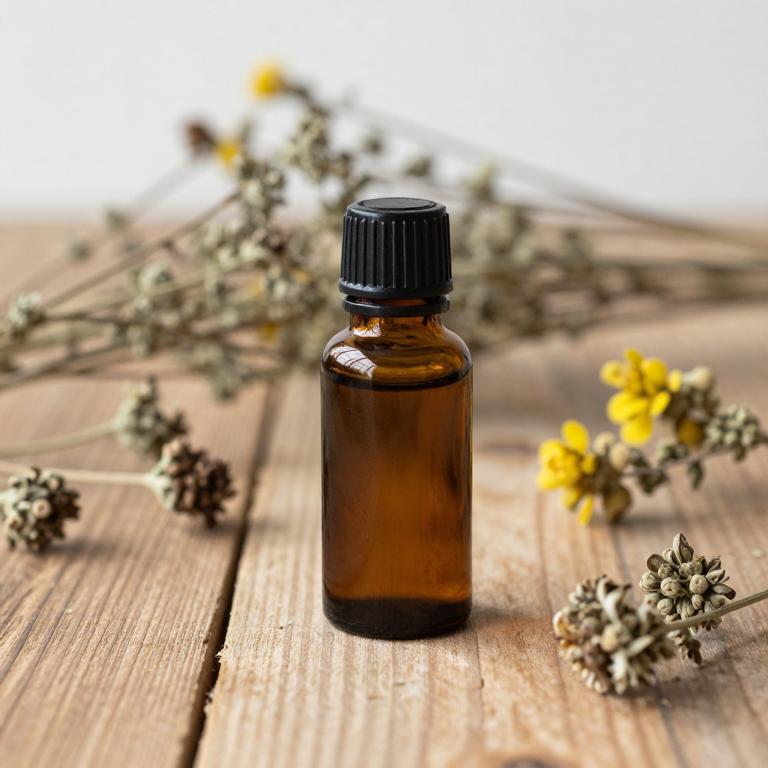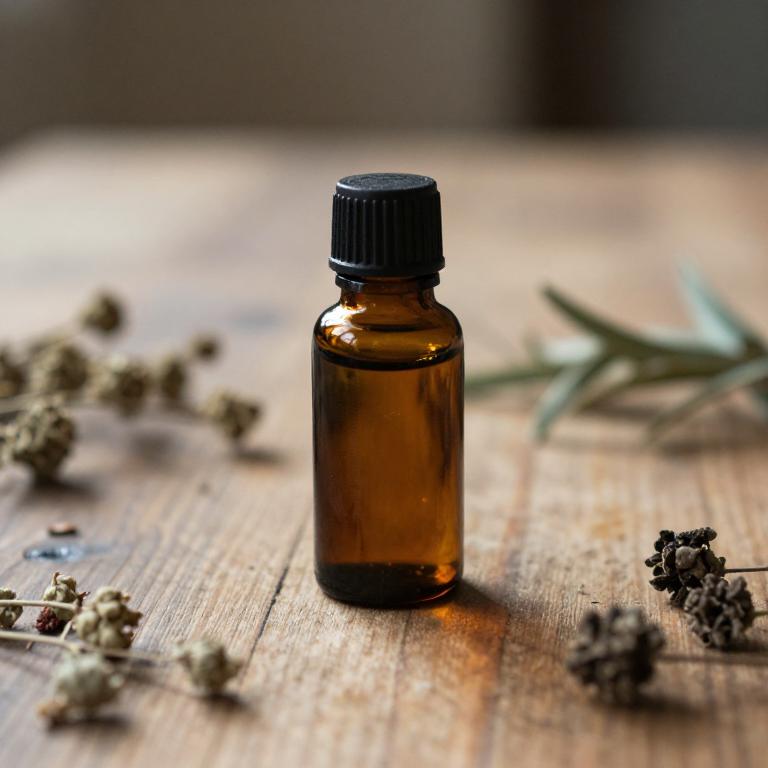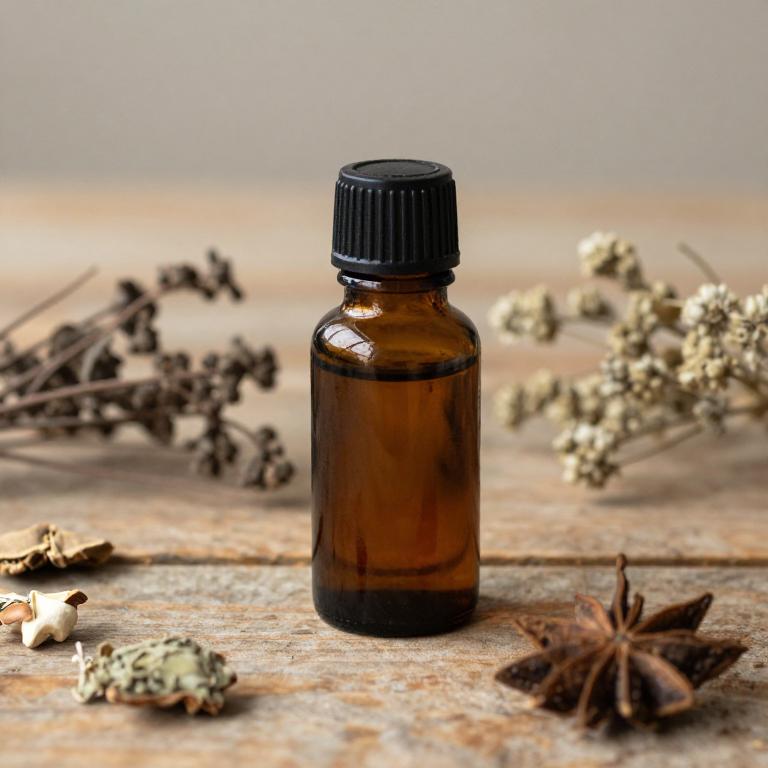10 Best Herbal Essential Oils For Ringworm

Herbal essential oils have gained popularity as natural remedies for treating ringworm, a fungal infection of the skin.
Oils such as tea tree, lavender, and oregano are known for their antifungal properties and can be applied topically to affected areas. These oils work by inhibiting the growth of fungi and reducing inflammation and itching associated with the infection. To use them safely, it is recommended to dilute the essential oils with a carrier oil like coconut or jojoba oil before application.
While they can be effective, it is important to consult a healthcare professional if the infection persists or worsens.
Table of Contents
- 1. Melaleuca (Melaleuca alternifolia)
- 2. Polium germander (Teucrium polium)
- 3. Thyme (Thymus vulgaris)
- 4. Eucalyptus (Eucalyptus globulus)
- 5. English lavender (Lavandula angustifolia)
- 6. Ceylon cinnamon (Cinnamomum zeylanicum)
- 7. Rosemary (Rosmarinus officinalis)
- 8. Lemon grass (Cymbopogon citratus)
- 9. Ginger (Zingiber officinale)
- 10. Camphor tree (Cinnamomum camphora)
1. Melaleuca (Melaleuca alternifolia)

Melaleuca alternifolia, commonly known as tea tree oil, is a popular herbal essential oil known for its potent antifungal and antimicrobial properties.
It has been widely used in natural remedies for skin conditions, including ringworm, which is a fungal infection caused by dermatophytes. When applied topically, tea tree oil can help reduce fungal growth and alleviate symptoms such as itching and redness. However, it is important to dilute the oil with a carrier oil before use to prevent skin irritation.
While tea tree oil may offer relief for mild cases of ringworm, it is advisable to consult a healthcare professional for persistent or severe infections.
2. Polium germander (Teucrium polium)

Teucrium polium, commonly known as summer savory, contains essential oils that have demonstrated antifungal properties, making them a promising natural remedy for treating ringworm.
The essential oils derived from this plant include compounds such as thymol, carvacrol, and linalool, which are known for their ability to inhibit fungal growth. Studies suggest that these oils can disrupt the cell membranes of fungal pathogens, thereby reducing the infection's progression. When applied topically, Teucrium polium essential oils may help alleviate symptoms such as itching and redness associated with ringworm.
However, it is important to dilute the oils properly and consult a healthcare professional before using them as a treatment.
3. Thyme (Thymus vulgaris)

Thymus vulgaris, commonly known as thyme, is a popular herb used in traditional medicine for its potent antimicrobial properties.
The essential oil derived from thyme contains compounds like thymol and carvacrol, which have been shown to exhibit strong antifungal activity. These components can help inhibit the growth of dermatophytes, the fungi responsible for ringworm infections. When used topically, thyme essential oil may provide a natural alternative for treating fungal infections such as ringworm.
However, it should be diluted with a carrier oil to avoid skin irritation and used under the guidance of a healthcare professional for safe and effective application.
4. Eucalyptus (Eucalyptus globulus)

Eucalyptus globulus, also known as Australian eucalyptus, is a popular herbal essential oil commonly used for its antifungal and antimicrobial properties.
It contains compounds like cineole and eucalyptol, which have been shown to inhibit the growth of fungi, including those responsible for ringworm. When diluted properly, eucalyptus globulus essential oil can be applied topically to affected skin areas to help reduce symptoms and promote healing. However, it is important to perform a patch test and consult with a healthcare professional before using it, especially for individuals with sensitive skin or existing skin conditions.
This essential oil is often used in natural remedies for fungal infections, offering a potential alternative to conventional treatments.
5. English lavender (Lavandula angustifolia)

Lavandula angustifolia, commonly known as English lavender, is widely recognized for its therapeutic properties, including its ability to combat fungal infections like ringworm.
The essential oil derived from this plant contains compounds such as linalool and linalyl acetate, which exhibit antifungal and antimicrobial effects. When applied topically, lavender essential oil can help reduce the symptoms of ringworm by inhibiting the growth of dermatophytes, the fungi responsible for the infection. It is often used in diluted form in creams, salves, or diffusers to provide a soothing and healing effect on affected skin.
However, it is important to consult a healthcare professional before using essential oils, especially for persistent or severe cases of ringworm.
6. Ceylon cinnamon (Cinnamomum zeylanicum)

Cinnamomum zeylanicum, commonly known as cinnamon, is a plant whose essential oil has been traditionally used for its antimicrobial and antifungal properties.
The essential oil derived from its bark contains compounds like cinnamaldehyde, which exhibit potent antifungal activity against various dermatophytes, including those responsible for ringworm. Studies suggest that cinnamon oil may help inhibit the growth of Trichophyton species, the primary causative agents of ringworm infections. When applied topically, it can serve as a natural alternative to conventional antifungal treatments, though it should be diluted to avoid skin irritation.
Overall, cinnamon essential oil shows promise as a complementary therapy in the management of ringworm, supporting holistic approaches to fungal skin infections.
7. Rosemary (Rosmarinus officinalis)

Rosmarinus officinalis, commonly known as rosemary, produces an essential oil that has been traditionally used for its antifungal properties, making it a potential natural remedy for ringworm.
The oil contains compounds like camphor, cineole, and alpha-pinene, which exhibit antimicrobial and antifungal effects that may help combat the fungal infection caused by dermatophytes. When applied topically, rosemary essential oil can help reduce the symptoms of ringworm, such as itching and redness, by promoting skin healing and inhibiting fungal growth. However, it should be diluted with a carrier oil before use to avoid skin irritation, as undiluted essential oils can be too potent.
While rosemary essential oil may offer supportive benefits, it is not a substitute for medical treatment, and individuals should consult a healthcare professional for severe or persistent cases of ringworm.
8. Lemon grass (Cymbopogon citratus)

Cymbopogon citratus, commonly known as lemon grass, produces a valuable essential oil that has shown promise in the treatment of ringworm due to its antimicrobial and antifungal properties.
The oil contains compounds such as myrcene, citral, and geraniol, which exhibit strong antifungal activity against dermatophytes, the fungi responsible for ringworm infections. Studies suggest that topical application of lemon grass essential oil may help reduce fungal growth and alleviate symptoms such as itching and redness. However, it is important to dilute the essential oil properly with a carrier oil to avoid skin irritation.
While it may serve as a complementary therapy, it should not replace conventional medical treatments for ringworm without consulting a healthcare professional.
9. Ginger (Zingiber officinale)

Zingiber officinale, commonly known as ginger, is a plant whose essential oil has been traditionally used for its antimicrobial and anti-inflammatory properties.
The essential oil derived from ginger contains compounds such as zingiberene and gingerol, which exhibit antifungal activity against various dermatophytes, including those responsible for ringworm. Studies suggest that ginger essential oil may inhibit the growth of Trichophyton species, the primary causative agents of ringworm in humans and animals. While it is not a substitute for conventional antifungal treatments, it can be used as a complementary therapy in natural medicine approaches.
However, further clinical research is needed to confirm its efficacy and safety for treating ringworm specifically.
10. Camphor tree (Cinnamomum camphora)

Cinnamomum camphora, also known as Chinese camphor tree, produces essential oils that have been traditionally used for their antimicrobial and antifungal properties.
These essential oils contain compounds such as camphor, which exhibit potent antifungal activity against dermatophytes, the fungi responsible for ringworm infections. When applied topically, the oils can help reduce fungal growth and alleviate the symptoms associated with ringworm, such as itching and redness. However, due to its potency, it is important to dilute the essential oil with a carrier oil before applying it to the skin to prevent irritation.
While Cinnamomum camphora essential oils may offer a natural alternative for managing ringworm, they should not replace professional medical treatment, especially for severe or persistent infections.